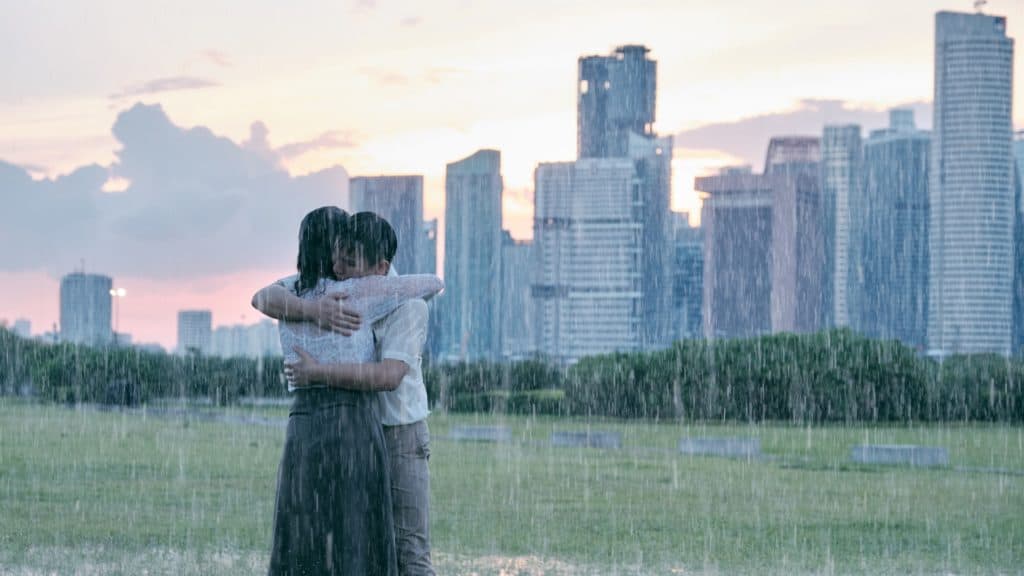Anthony Chen’s Wet Season, his follow up to the much-lauded Ilo Ilo, feels ostensibly like a movie about a city. It’s about Singapore, to be precise – a sprawling metropolitan city-state that is, depicted here, as constricting and cold and isolating. As a Malaysian, Singapore is often, to me, a beacon of progress, where its pristine infrastructure and glistening buildings can elicit envy. Yet Chen chose to shoot mostly within the confines of cramped apartments and cars, not at all interested in the veneer of the city but ready to delve, even harshly, into some of the cold realities of living in the city-state.
Though you certainly can’t avoid staying indoors in a movie where it is raining 90% of the time. It’s the rainy season in Singapore (monsoon season hits our side of the world early each year, typically bringing long bouts of rain and thunderstorms). Ling (Yeo Yann Yann), is living a dour life. Her school is downplaying the importance of Chinese, the subject she teaches, and she’s ploughing through a loveless marriage with an apathetic husband (Christopher Lee – no, not Saruman). Ling yearns for a child, but eight years of trying only serves to push her husband further away. Some days, the only company Ling has is her incapacitated father-in-law (Yang Shi Bin), whom she cares for after work.
In time, her company grows by one. Holding remedial classes for her students puts her closer to Wei Lun (Koh Jia Ler), a wushu competitor who lives an equally lonely life – his parents are often working overseas. A relationship soon blossoms, but can something truly bloom in such horrid weather?
In Wet Season, the rain doesn’t just serve as a mood dampener, but as a prison. As much as she is forced to remain indoors, Ling’s life is trapped by circumstances. Chen accentuates this with careful staging, sometimes framing the window bars of a classroom like a prison’s, and casting the indoors in harsh, cold lighting.
The sets speak as much as our characters – Wei Lun’s room is understandably decorated with posters of martial artists, especially Jackie Chan; but it’s Ling’s house – with its old, Chinese-styled furniture and trinkets, plus a particularly recurring calligraphy piece – that subtly represents her preferences and situation. Like her abode, Ling feels stuck in time, but what else can she really cling on if not to what she has?
You’d be forgiven to think that Wet Season is about romance, but I consider it a film about loneliness. Ling, a Malaysian native, is alienated and isolated in the city not just by her husband, but by the pockets of society she engages with. Her husband’s extended family barely acknowledges her, and considers her childlessness as a handicap. Ling is further doused with instances of sexism, and it doesn’t help that the nation’s education system views Chinese studies as secondary, and certainly not the same level as “pragmatic” like math and science.
Ling’s arc in the movie is that of finding relevance, which is no surprise that she finds joy in the two people that actively depend on her – her father in-law, and Wei Lun. The three people are isolated by their own circumstances, and the few moments of them finding each other mark the warm spots in an otherwise depressingly cold film.
Yet even these moments are arguably bittersweet. Ling and Wei Lun’s relationship would certainly rankle some chains, but even their time together is framed as tragic – more the by-product of an uncaring city than as a star-crossed lovers situation. Theirs is a complex relationship. As Chen puts it in an interview with Timeout, the ambiguity in human connections and bonds is what intrigues him.
Chen intercuts several of his scenes with news broadcast of political unrest in neighbouring Malaysia (mostly pertaining to the 1MDB scandal and the subsequent political fallout), and Ling’s family wastes few opportunities to tell her how lucky she is that she married into Singapore. This is where Wet Season feels like a critique of the country it is set in. It seemingly says that Singapore may be the poster child of Southeast Asia — a source of envy to the other developing nations — but within its shiny lustre are systems and social norms that remain problematic; that women are still bound by restrictive expectations and gender bias.
Like Ling, perhaps Singapore is still stuck one way or another. Not necessarily worse, but not necessarily better, either. Like all Southeast Asian countries during the rainy season, we all get equally wet.
Also published on Medium.

makes it a life goal to annoy everyone with random Disney trivia. When he’s not staring at a screen or holding a controller of some sort, he is thinking about curry noodles. Like right now.



